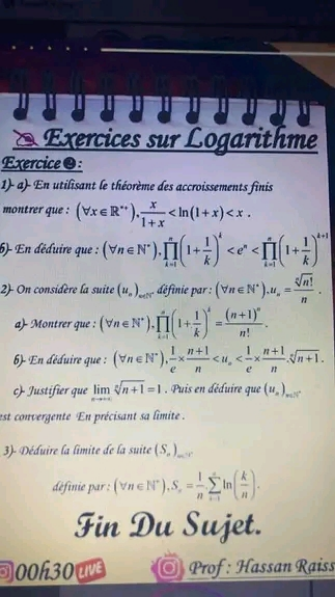Question Number 204174 by patrice last updated on 08/Feb/24

Answered by Faetmaaa last updated on 27/Feb/24
![3)- ∀n∈N^★ S_n = (1/n)Σ_(k=1) ^n ln((k/n)) = ((1−0)/n)Σ_(k=1) ^n ln(0+k((1−0)/n)) →_(n→∞) ∫_0 ^( 1) ln(x)dx = [x(ln x −1)]_0 ^1 = −1](https://www.tinkutara.com/question/Q204811.png)
$$\left.\mathrm{3}\right)- \\ $$$$\forall{n}\in\boldsymbol{\mathrm{N}}^{\bigstar} \\ $$$${S}_{{n}} \:=\:\frac{\mathrm{1}}{{n}}\underset{{k}=\mathrm{1}} {\overset{{n}} {\sum}}\mathrm{ln}\left(\frac{{k}}{{n}}\right) \\ $$$$\:\:\:\:\:\:=\:\frac{\mathrm{1}−\mathrm{0}}{{n}}\underset{{k}=\mathrm{1}} {\overset{{n}} {\sum}}\mathrm{ln}\left(\mathrm{0}+{k}\frac{\mathrm{1}−\mathrm{0}}{{n}}\right) \\ $$$$\underset{{n}\rightarrow\infty} {\rightarrow}\:\int_{\mathrm{0}} ^{\:\mathrm{1}} \mathrm{ln}\left({x}\right)\mathrm{d}{x} \\ $$$$\:\:\:\:\:=\:\left[{x}\left(\mathrm{ln}\:{x}\:−\mathrm{1}\right)\right]_{\mathrm{0}} ^{\mathrm{1}} \\ $$$$\:\:\:\:\:=\:−\mathrm{1} \\ $$
